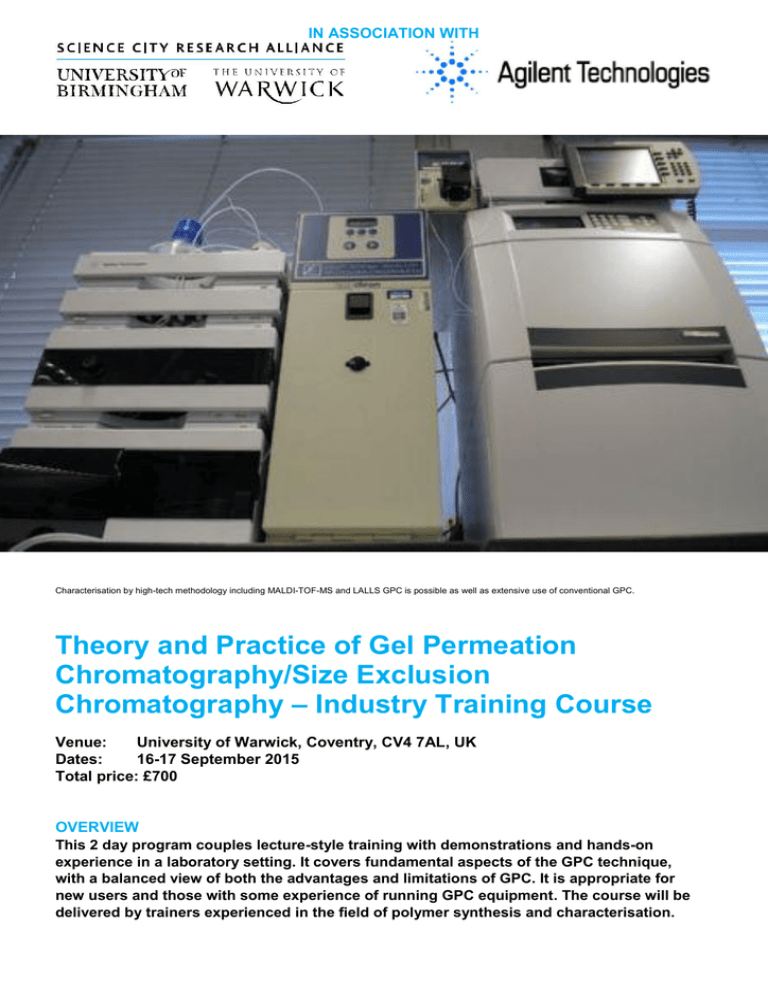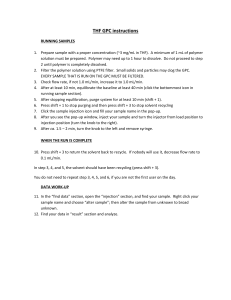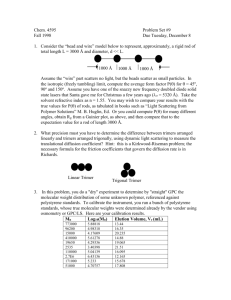IN ASSOCIATION WITH
advertisement

IN ASSOCIATION WITH Characterisation by high-tech methodology including MALDI-TOF-MS and LALLS GPC is possible as well as extensive use of conventional GPC. Theory and Practice of Gel Permeation Chromatography/Size Exclusion Chromatography – Industry Training Course Venue: University of Warwick, Coventry, CV4 7AL, UK Dates: 16-17 September 2015 Total price: £700 OVERVIEW This 2 day program couples lecture-style training with demonstrations and hands-on experience in a laboratory setting. It covers fundamental aspects of the GPC technique, with a balanced view of both the advantages and limitations of GPC. It is appropriate for new users and those with some experience of running GPC equipment. The course will be delivered by trainers experienced in the field of polymer synthesis and characterisation. Background Course delivery Gel Permeation, or Size Exclusion Chromatography (GPC/SEC) is one of the most powerful and versatile analytical techniques available for understanding and predicting polymer performance. It is the most convenient technique for characterising the complete molecular weight distribution of a polymer, which is one of its most fundamental characteristics. The University of Warwick is consistently ranked with the top Universities both nationally (ranked 3rd in the country in the 2011 Guardian University league tables league table) and globally. Our academics are internationally recognised, with 75% of our research being internationally excellent and world leading. The University continuously invests to guarantee world-class quality in both education and research. The polymer analysis laboratory in the Department of Chemistry is equipped with state of the art instruments to which participants will have hands on access during the course. This is important, since it affects many of the characteristic physical properties of a polymer. Subtle batch-to-batch differences in measurable values can cause significant differences in the end-use properties of a polymer which include: tensile strength, toughness, brittleness, adhesive strength, impact strength, elastic modulus, drawability, coefficient of friction and stress-crack resistance to name but a few. Where a polymer’s end-use application requires precision performance or endurance, the need for polymer characterisation is particularly acute. Because GPC fulfils these needs better than any other single technique, it has become an extremely valuable tool for materials characterisation in the polymer industry. Who should attend? This course is designed for analysts, quality control engineers, managers or researchers who have an interest in GPC or currently use GPC. The course focuses on providing and improving overall skills set. Key topics covered ■ ■ ■ ■ ■ ■ ■ ■ ■ ■ ■ ■ Objectives of GPC Analysis: Applications in the real world How GPC works: Advantages and Limitations Basic Chemistry: Monomers, Oligomers, polymers, Elastomers and Coploymers GPC Instruments and Systems Detectors Sample Preparation: Sample solubility and eluent choice Column Selection and Changing columns Analysis Conditions and method optimization Best Practice: Procedures, traceability and repeatability Calibration and Standards: Narrow/Broad/Universal/Integral Software, Data & Interpretation Supporting techniques for polymer analysis How you will benefit from the course Professor Dave Haddleton is the Director of the training course and is supported by Warwick personnel and other associated experts in the field. He has gained broad experience in the field of polymer chemistry over many years and is very experienced with teaching and training. His career started as a polymer chemist at ICI and he worked both in the UK and the US developing polymer synthesis. He later worked for Zeneca in its bioscience business. He began working at the University of Warwick in 1993 and has been key to the development of a new process to design polymers with specific properties, and the filing of patents has enabled the spin-out of a company called Warwick Effect Polymers to make commercial use of the processes. Dave is currently Editor-in-Chief of the Royal Society of Chemistry’s ‘Polymer Chemistry’ journal and collaborates with companies as BP, Lubrizol and Unilever. Agilent Technologies Lda is a leader in life sciences, diagnostics and applied chemical markets. The company provides laboratories worldwide with instruments, services, consumables, applications and expertise, enabling customers to gain the insights they seek. Agilent’s expertise and trusted collaboration give them the highest confidence in our solutions. Agilent focuses its expertise on six key markets, where we help our customers achieve their goals: Food; Environmental and Forensics; Pharmaceutical; Diagnostics; Chemical and Energy and Research. Agilent Technologies was born out of Hewlett-Packard in 1999 as the largest initial public offering in Silicon Valley history. The heritage in analytical analysis and specifically GPC has been bolstered by their acquisition of Varian (previously Polymer Laboratories) bringing over 30 years of expertise in the field to bear. Agilent now offers a comprehensive portfolio of GPC/SEC Instruments, columns and calibrants for high performance separations based on molecular size in solution. Agilent delivers leading solutions for characterising and separating polymers by GPC/SEC, and manufactures all components for accurate polymer analysis. ■ It will equip you to produce and analyse data; to qualify the condition of the analytical system and separation columns; to optimise the application conditions and the work flow in the lab ■ You will receive practical advice to get reproducible and accurate separations ■ Learn tricks of the trade to enhance your systems precision and sensitivity, as well as troubleshooting strategies ■ The course set-up provides a networking environment and face to face discussion with experienced GPC practitioners and providers ■ This training course is a mixture of lecture-style and laboratory based interaction intended to have some flexibility to accommodate attendee needs and to cover the understanding and techniques required for modern analysis using Gel Permeation Chromatography (GPC) For further information and bookings please contact: Dr Daniel Lester, GPC Manager, University of Warwick, Department of Chemistry, Library Road CV4 7AL Email: D.Lester@Warwick.ac.uk Phone: +44 (0)2476 574147

